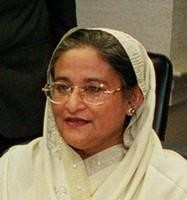The outcome of recent parliamentary elections in Bangladesh has not only paved the way for the return of parliamentary democracy, but has also demonstrated that the highly religious but moderate Muslim nation of 144 million is unwilling to embrace divisive Islamist political parties. The elections, initially scheduled for 2007 and the first since 2001, followed the lifting of a state of emergency last month. Led by Sheikh Hasina of Awami League, the secular Grand Alliance -- or Mohajat -- swept the elections, decimating former Prime Minister Khaleda Zia's Bangladesh National Party (BNP) and its ally Jamaat-e-Islam, and sending a clear signal that religion does not attract votes in the country. The two women, Hasina and Khaleda, had alternated in power from 1991 to 2006. But general elections were canceled in 2007 following widespread violent protests and a massive blockade organized by Awami League, which accused election officials of favoring Khaleda's BNP. A caretaker government subsequently imprisoned most of the country's prominent politicians, including the two begums, on charges of corruption. Under intense domestic and international pressure, the regime agreed to hand over power to an elected government, holding elections on Dec. 29.
Bangladesh Elects Secular Alliance, Dealing Blow to Fundamentalism

